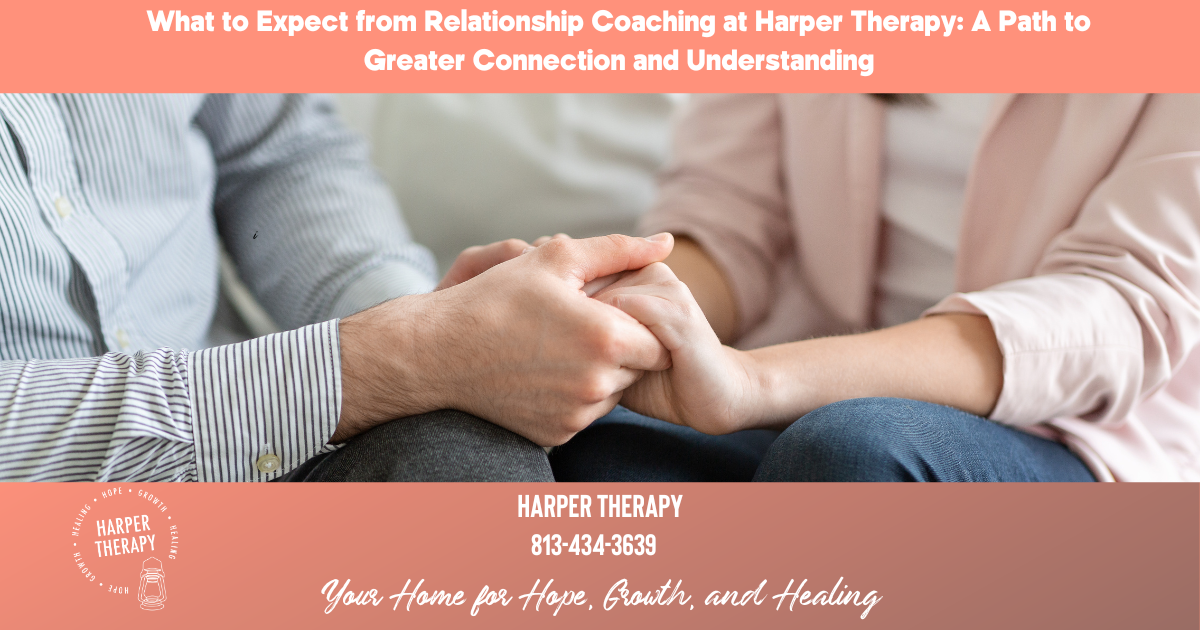What to Expect from Relationship Coaching at Harper Therapy: A Path to Greater Connection and Understanding
If you’re facing frequent conflicts, emotional disconnection, or communication challenges in your relationship, you might be wondering whether relationship coaching is the right step for you. You are not alone—many couples experience similar difficulties, and relationship coaching can offer practical tools and guidance to help you create a healthier, more fulfilling relationship.
Relationship coaching is a proactive approach focused on improving communication, emotional intimacy, and relational skills. Relationship coaching explores past wounds and traumas while also emphasizing actionable steps and solutions that you and your partner can implement right away. Here's what you can expect from the process of relationship coaching.
1. Goal-Oriented and Practical Solutions
One of the key features of relationship coaching is its emphasis on setting clear, achievable goals for your relationship. From improving communication to rebuilding trust, relationship coaching helps couples identify the specific areas they want to work on and develop a roadmap for success. Coaches act as mentors, offering practical strategies and tools that can be applied immediately. This future-focused approach ensures that you’re working toward concrete improvements rather than simply revisiting past issues.
Coaching also provides accountability. Your coach will help you and your partner stay on track with the goals you’ve set, checking in regularly to see how well the strategies are working and where adjustments might be needed. This structure makes relationship coaching an excellent choice for couples who are motivated to create positive change and see tangible results relatively quickly.
2. Honest Conversations in a Safe Space
Relationship coaching offers a structured environment where you and your partner can have honest, productive conversations. Coaches are trained to facilitate these discussions in a way that fosters openness, mutual respect, and understanding. You’ll explore how each of you is showing up in the relationship, what might be contributing to conflicts, and how both partners can take responsibility for improving the dynamic.
Terry Real’s Relational Life Therapy (RLT), for example, is a coaching model that encourages direct but compassionate truth-telling. RLT coaches help couples confront the dysfunctional patterns that keep them stuck while providing them with the tools they need to shift these behaviors. This approach creates an opportunity for dramatic relationship transformations through deep self-awareness and new relational skills.
3. Building Relational Skills for the Long Term
While relationship coaching helps couples address immediate concerns, it also focuses on building skills that foster long-term relationship success. Through coaching, you’ll learn how to communicate more effectively, resolve conflicts in a healthier way, and build emotional intimacy. These are not just quick fixes—they are lifelong skills that can be applied to your relationship with your partner as well as with family, friends, and even coworkers.
In the RLT framework, coaches teach powerful relational skills that allow couples to break negative patterns and create more connected, balanced relationships. These skills include how to listen empathetically, express needs without blaming or criticizing, and maintain emotional regulation during difficult conversations. As you and your partner learn these tools, you’ll be able to nurture a relationship that is more resilient and fulfilling.
4. A Collaborative Process
Relationship coaching is a highly collaborative process, meaning that both partners need to be actively engaged and committed to the process. Your coach will guide you, but you and your partner will do the real work of applying what you’ve learned. Together, you’ll practice new communication techniques, work through misunderstandings, and implement changes that can help your relationship grow stronger.
For those who value personal development and want to improve their emotional intelligence within their relationship, coaching offers a great balance of guidance and personal responsibility. It’s a space where you can learn about yourself, understand your partner’s emotional needs, and build healthier patterns of relating.
5. Deep Impact
The impact of relationship coaching can be long-lasting. When you apply the relational skills you’ve learned to your daily life, you’ll continue to see the benefits in how you and your partner communicate, resolve issues, and build emotional closeness.
Relationship coaching, especially through models like RLT, offers a powerful blend of immediate practical tools and deep relational insights. It helps couples not only address the challenges they’re facing right now but also prepares them to navigate future conflicts with greater confidence and compassion.
Is Relationship Coaching Right for You?
If you’re motivated to work on your relationship, eager to learn new skills, and open to personal growth, relationship coaching could be the perfect next step. Whether you’re looking to address communication problems, rebuild trust, or simply deepen your connection, coaching provides the structure, guidance, and tools to help you move forward.
Ultimately, relationship coaching is about empowering you and your partner to create the kind of relationship you truly want—a relationship that is healthy, supportive, and full of emotional connection.
If you are interested in learning more about relationship coaching at Harper Therapy call our office at 813-434-3639.

